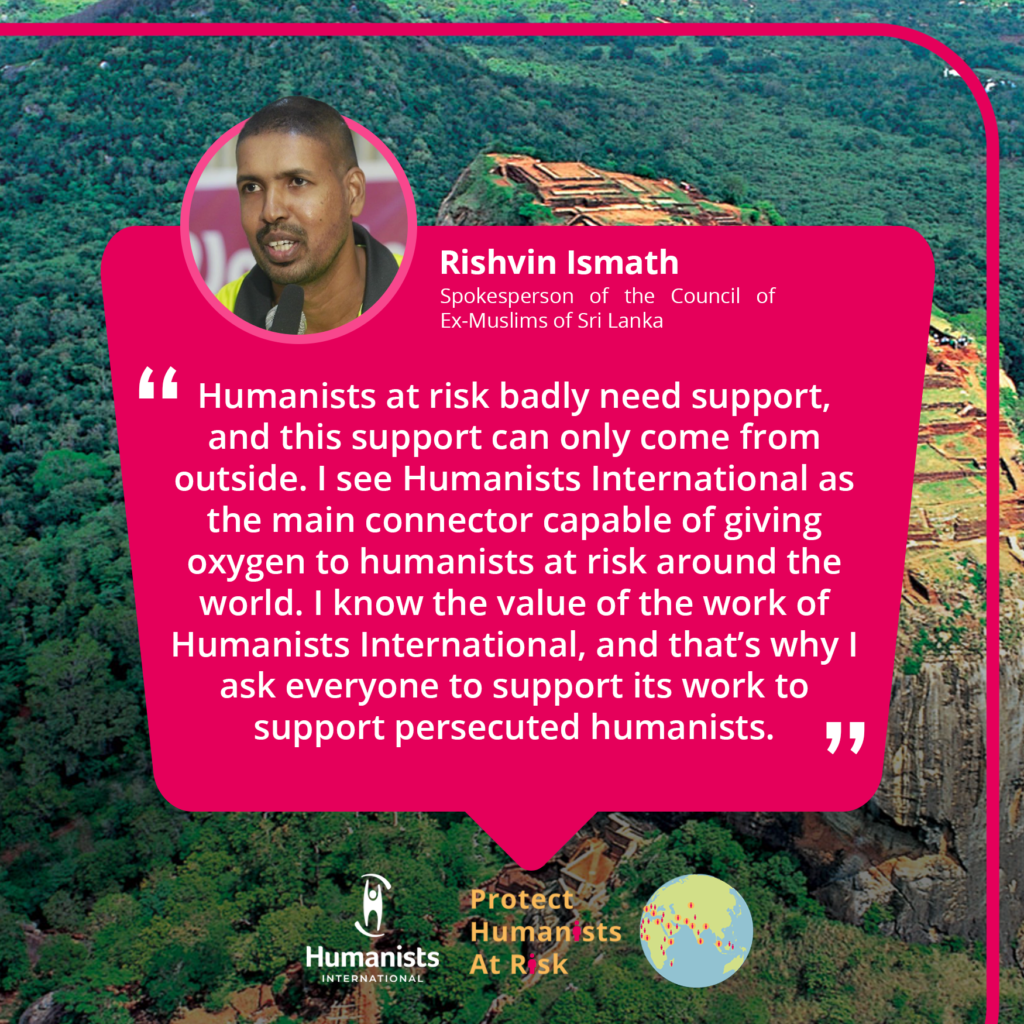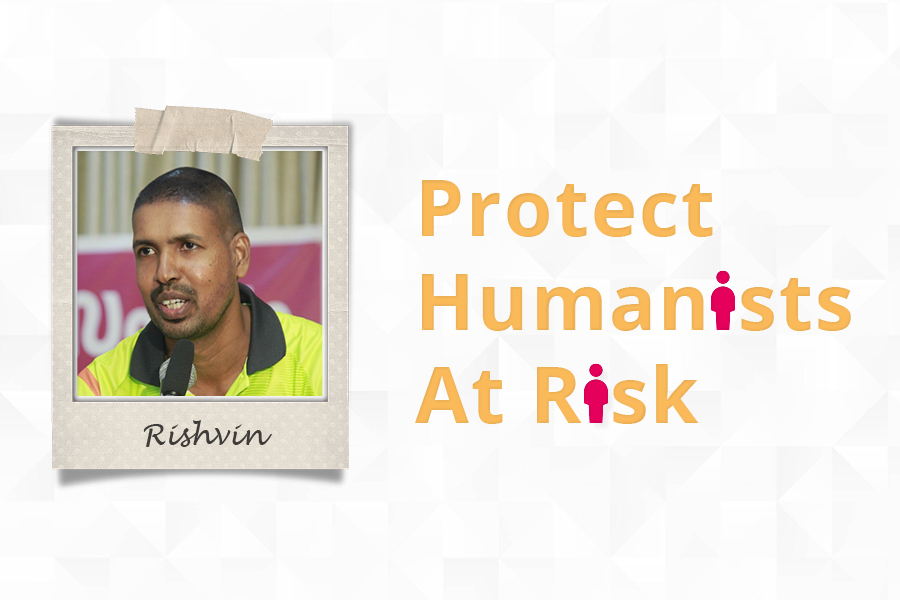Humanists International had the privilege of interviewing the Co-founder and Spokesperson of the Council of Ex-Muslims of Sri Lanka, Rishvin Ismath, currently living in hiding after he escaped multiple attempts of murder by Islamic fundamentalists in his country. The story of Rishvin shows to the global humanist community the urgency of supporting Humanists International’s work to #ProtectHumanistsAtRisk.
Humanists, atheists and non religious people in Sri Lanka face discrimination and persecution on a daily basis, especially if they come from a Muslim background. Even though Sri Lanka is not a Muslim country (the majority of the population is actually Buddhist), the strong presence of Islamic militants, fundamentalists and extremists is very powerful and dangerous.
The story of Rishvin Ismath is exemplary in this regard: after years of activism as an Islamic preacher, Rishvin left Islam in 2013 and founded the Council of Ex-Muslims of Sri Lanka in 2016 (the only explicitly non-religious organization in the country) causing in this way the backlash of Islamic terrorist groups, which tried to kill Rishvin at least six times, as confirmed by the Sri Lankan police to Rishvin himself in 2019.
“Humanists at risk badly need support, and this support can only come from outside. I see Humanists International as the main connector capable of giving oxygen to humanists at risk around the world. I know the value of the work of Humanists International, and that’s why I ask everyone to support its work to support persecuted humanists”.
Rishvin Ismath
The one-hour long video interview above is at the same time inspiring and worrying – you can read a list of the most significant highlights below: on the one hand, it shows the courage and the determination of Rishvin, who after the unexpected public outing in 2019 is considered to be the only outspoken ex-Muslim in his country; on the other hand, it tell us with crudeness how harsh and life-threatening the life of Sri Lankan humanists can be when they end up on the radar of religious fundamentalist groups.
In agreement with Rishvin, Humanists International decided to publish this interview to seek support from the global humanist community for our #ProtectHumanistsAtRisk campaign – any amount can make a difference to the lives of many individuals at risk around the world, so please consider making a donation today.

Highlights from the interview
Click on the minute to jump to the respective part of the interview.
- 01:00: Rishvin talks about his childhood as a refugee during the Sri Lankan Civil War, when his family was chased away at gunpoint by the Liberation Tigers of Tamil Eelam;
- 01.40: Rishvin’s family ends up in a city dominated by Islamist groups such as Thabliq Jamath and Sri Lanka Jamathe Islamii, where he attends a government school controlled by the Islamic movement and is indoctrinated to a strict Islamic orthodoxy;
- 02:44: Rishvin explains the difference between Muslims, Islamists and Jihadists;
- 04.40: Rishvin explains the absurdity of government-funded schools, segregated by race and religion; Islamic textbooks teach students that the penalty for apostates of Islam is “murder”, according to the Sharia law;
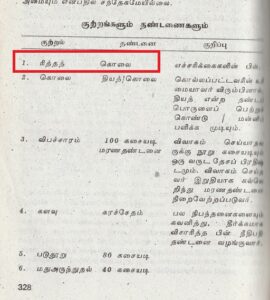
A page of an Islamic textbook in Sri Lanka teaching that the right punishment for apostasy (“Riddha”) is “murder”.
- 07:00: Rishvin gives more details about the kind of indoctrination suffered at Muslim schools, learning for example that the world has been created by Allah, that evolution is wrong, etc.;
- 08:22: Rishvin talks about his years as an Islamist teenager when he believed that music was “blasphmeous” (Haram);
- 10:48: Rishvin starts talking about his “long journey” to humanism;
- 11:10: Rishvin studies foreign languages and earns a good income as a tourist guide, but Sri Lanka is devastated by the 2004 tsunami, during which Rishvin has a near-death experience, leading him into an existential and religious crisis;
- 12:22: Rishvin starts questioning his life as good Muslim, so he quits his job, moves back to his hometown and joins the Wahhabi movement;
- 13:31: Rishvin describes his early 20s as an Islamist activist, studying the Quran and the Hadiths under the guide of Mullahs;
- 14:46: Rishvin talks about how he shut down any inner doubt when he found out that the Prophet Muhammad married a 6-year old girl, Aisha;
- 17:03: In 2009 Rishvin moves to Saudi Arabia, because he thinks that the environments in all other countries are “un-Islamic”;
- 18:07: In 2011 Rishvin moves back to Colombo, Sri Lanka, where he is faced with a new insurgence of racism against Muslims;
- 18:29: Rishvin is added to a secret Islamist Facebook group called “We just need two minutes of your time”, used for mass reporting to Facebook any racist post against Muslims in Sri Lanka;
- 21:53: Rishvin starts questioning his faith by reading the constructive criticism of atheist users on the group, posing rational questions about the tenets of Islam;
- 23:06: Rishvin’s skepticism grows and he starts to question the exemplarity of the Prophet Muhammad;
- 23:35: In 2013, Rishvin starts a one-year long gradual and hidden distancing from religion, starting by skipping the early morning prayer;
- 24:40: Rishvin starts criticizing Islam online in a constructive way, arousing suspicion in his community of having converted to other Islamic sects;
-
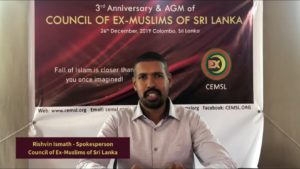
Rishvin co-founded CEMSL in 2016, three years after leaving Islam.
- 25:33: In 2016, a Mullah with ISIS’s sympathies (who years later would be investigated as a suspect in the 2019 Easter Bombing in Sri Lanka) confronts Rishvin publicly online; quickly after Rishvin starts receiving death threats;
- 28:09: Rishvin goes to the Terrorism Investigation Division of the Sri Lankan Police to denounce the death threats and to warn them that ISIS was in the process of becoming a strong group and the possibilities of planning a terrorist attack in Sri Lanka; the police ignores Rishvin’s multiple warnings;
- 29:49: In 2017 Rishvin receives new death threats and denounces them again to the police, which again fall to deaf ears;
- 32:47: In 2018, Rishvin fears for his life and limits his outside movements, in a sort of “self imposed lockdown”;
- 33:25: On Sunday 21 April 2019 Rishvin receives the news about the Easter suicide bomber attacks; Rishvin is informed by a friend in intelligence that the terrorists were the same people he denounced to the police two years earlier;
- 34:33: One month after the blast, Rishvin is informed by the police about the murder attempts against him, which failed only because the attackers could not find Rishvin alone to kill him without leaving any trace;
- 36:33: Rishvin talks about his de-conversion “in hiding”;
- 37:13: Police speak with Rishvin and confirm that his statement matches with the information at their disposal about the attackers;
- 37:50: Rishvin talks about the foundation of the Council of Ex-Muslims of Sri Lanka in 2016;
- 39:04: A crucial moment for Rishvin’s life when he appears before the Parliamentary Select Committee to give statement, made in front of the camera of media television; the video of Rishvin’s statement goes viral on television news and he is eventually “outed” as an ex-Muslim;
- 40:14: Details of the statement, including calling out the Islamist textbooks teaching kids the murder of apostates of Islam;
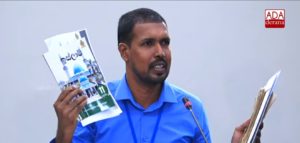
Rishvin in 2019 at the Parliamentary Select Committee exposing the truth about Islamic text books teaching kids to murder apostates of Islam.
- 44:20: Rishvin mentions the support provided by Humanists International during those days;
- 44:43: in what sense Rishvin is the only outspoken ex-Muslims in Sri Lanka, and what effects this had on the humanist community in the country;
- 45:25: Rishvin talks about the struggle of ex-Muslims and humanists at risk during the pandemic;
- 48:00: Rishvin talks about his life right now and the impact of this pandemic on his mental health;
- 49:29: Rishvin and Giovanni talk about the Protect Humanists At Risk campaign;
- 50:38: Rishvin talks about the work of CEMSL in defence of Muslims unjustly discriminated against in Sri Lanka;
- 55:21: Rishvin talks about the support received by Humanists International and the importance of its work, the power of its membership network and the urgency to protect Humanists At Risk.

